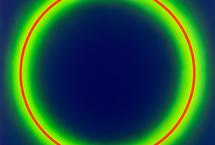The Galería Javier López & Fer Francés is proud to present a new project by the renowned abstract painter José María Yturralde (b. Cuenca, 1942). After four years of intense activity, he is returning to our exhibition space with Enso, which brings together much of his recent work. The Japanese word ensō means circle, and it refers to a calligraphic symbol associated with ideas of enlightenment, the universe and the void. In Zen Buddhist painting it symbolizes an instant when the mind is freed to create, and the form of a single stroke shows the expressive movement of the spirit at a unique moment. The circular shape dominates Yturralde’s most recent paintings, which are shown here alongside works from the series Horizontes (Horizons), and both share an engagement with the concept of the infinite expressed through the presence / absence of colour-light in space.
He received his initial training in Valencia at the end of the 1950s, drawn to the constructivist aesthetic of the “arte normativo” movement, and ever since, José María Yturralde has sought a balance between the coldness of geometric abstraction and the warmth of expressive use of colour. Along with others in the Antes del Arte group, he took a perceptual approach to art, with its implicit democratization of art as a rational experience. During and after residences at the Computing Centre of Complutense University in Madrid (1968 – 1973) and the Center for Advanced Visual Studies at MIT (1974 – 1978), he aimed to bring together two spheres that he saw as complementary, science and art, using technological advances to realize his works in an innovative way, without forgetting the role of sensitivity and emotion in making them unique.
Yturralde seeks to transcend the two dimensions of the picture’s plane surface, introducing the fourth dimension, time, which leads him to reflect on themes of the absolute and, by extension, the sublime. He does not conceive of space as a passive void but one permeated by tensions, forces, radiation and emotion, as the power of energy and matter. Knowledge of our material and transcendent reality drives him to concentrate on the infinitesimal and the infinite to approach the threshold of our consciousness, the limit beyond which may lie a new beginning. In these pictorial haikus, he condenses the immensity of the knowable universe, offering powerful images for contemplation where aesthetic intensity is reached through compositional simplicity.
If the titles in the series Horizontes evoke the names of stars, some of them related to classical mythology, in the series Enso and his most recent works, the references embrace deities of many different cultural traditions, from Egyptian to Norse by way of Greek, Roman and Indian, in the ancestral personification of the natural world, the hours of the day and seasons of the year, evoking a wheel of time endlessly turning. In Eastern thought time is not linear but cyclical, a circle without beginning or end.
José María Yturralde’s work is part of many public and private collections in Spain and internationally. The Spanish institutions that hold works of his include MNCARS in Madrid, IVAM in Valencia, CAB in Burgos, CAAC in Seville, the Patio Herreriano in Valladolid, the Museum of Abstract Art in Cuenca, the Juan March Foundation, the Pilar and Joan Miró Foundation in Mallorca, and the National Library of Spain. His solo exhibition Transfinito at CAC Málaga closed a few months ago, and he is currently preparing a show at the La Nau Cultural Centre at the University of Valencia.
